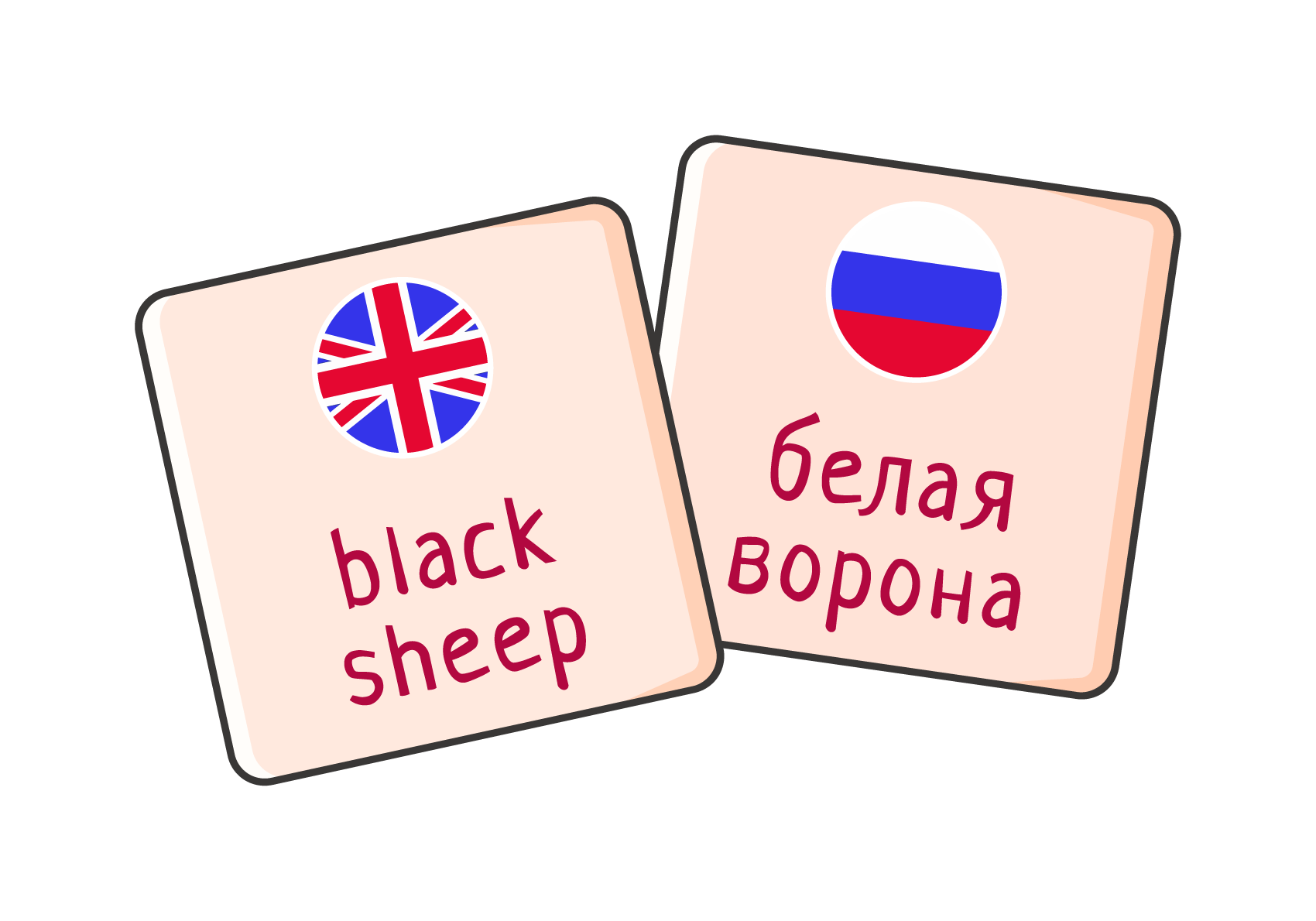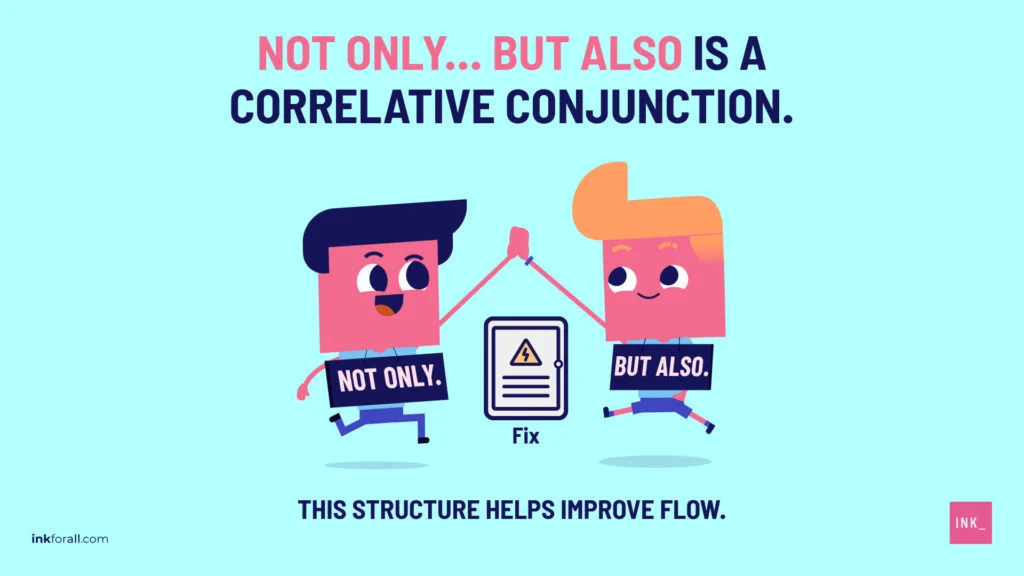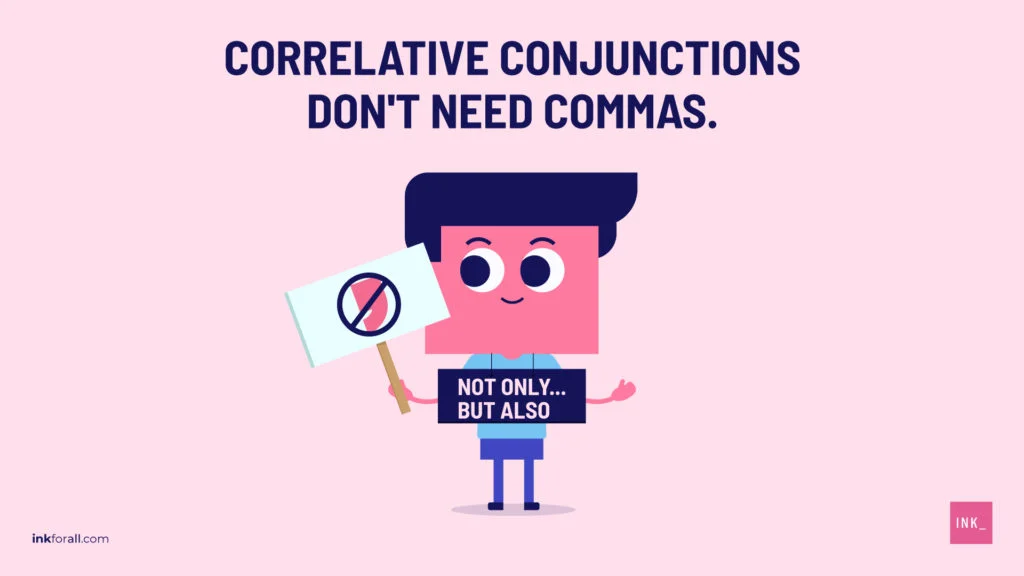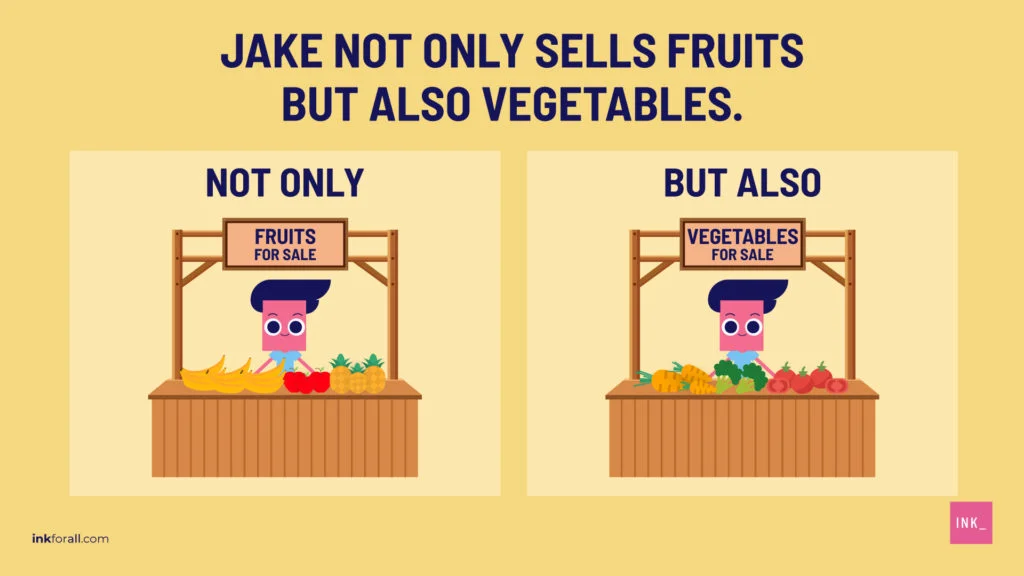Сегодня я расскажу о полезном обороте, который сам часто употребляю в речи — устной и письменной. Его логическая схема такая: «Я не только действие А, но и действие Б«. Например: «Я не только знаю этого человека, мы вместе учились в школе». Этот оборот имеет смысл изучать и брать на вооружение, если вы уже знакомы с основами грамматики.
В обороте постоянен только элемент «Not only», все остальное — это переменные. Схема оборота следующая:
Not only + вспомогательный/модальный глагол + подлежащее 1 + действие 1 + but (можно опустить) + подлежащее 2 и действие 2.
Выглядит сложно, но давайте рассмотрим схему в виде таблицы с примерами, все станет понятнее:
| Not only | Вспом./мод. глагол | Подлежащее | Действие 1 | (but) + Подлежащее 2 и Действие 2 |
|---|---|---|---|---|
| Not only | do | I | know that person, | we went to school together |
| No only | can | he | sing, | he also dances really well! |
| Not only | was | I | paid, | but I was given a bonus |
| Not only | don’t | they | fight, | they don’t even raise loud voices at one another. |
Перевод предложений:
Not only do I know that person, we went to school together. — Я не только знаю этого человека, мы вместе учились в школе.
Not only can he sing, he also dances really well! — Он не просто умеет петь, он к тому же действительно хорошо танцует!
Not only was I paid, but I was given a bonus. — Мне не только заплатили, но еще и дали премию.
Not only don’t they fight, they don’t even raise loud voices at one another. — Они не только не ссорятся, они даже голос друг на друга не повышают.
Здравствуйте! Меня зовут Сергей Ним, я автор этого сайта, а также книг, курсов, видеоуроков по английскому языку.
Подпишитесь на мой Телеграм-канал, чтобы узнавать о новых видео, материалах по английскому языку.
У меня также есть канал на YouTube, где я регулярно публикую свои видео.
Рассказали, как и зачем использовать вопросительный порядок слов в отрицательных утверждениях.
Инверсия — это изменение прямого порядка слов на вопросительный. Про некоторые случаи инверсии мы уже рассказывали в статье о порядке слов в английском языке, сегодня подробно рассмотрим отрицательную инверсию.
Функции и правила образования отрицательной инверсии
Отрицательная инверсия — характерный признак эмоционального высказывания или делового стиля в общении. Она характерна для английского языка, поэтому при переводе на русский этот прием могут опустить или передать с помощью дополнительных слов.
Never have I been abroad. — Никогда (в жизни) я не был за границей.
Чтобы построить предложение с отрицательной инверсией, достаточно поставить отрицательное слово, наречие или частицу not в начало предложения и последовать вопросительному порядку слов.
Наречие + вспомогательный/модальный глагол + подлежащее + сказуемое + остальные члены предложения
Never have I read such an interesting book. — Такую интересную книгу я никогда не читал.
Rarely can she impress her audience. — Редко у нее получается произвести впечатление на аудиторию.
Напомним, в вопросительном порядке слов вспомогательный или модальный глагол ставится перед подлежащим. Если в предложении с инверсией нет вспомогательного или модального глагола, добавляйте do, does или did.
Утверждение: I never go abroad. — Я никогда не езжу за границу.
Инверсия: Never do I go abroad. — Никогда я не езжу за границу.
Утверждение: I never went abroad. — Я никогда не ездил за границу.
Инверсия: Never did I go abroad. — Никогда я не ездил за границу.
В предложениях с инверсией порядок слов может нарушаться как в первой части предложения, так и во второй.
Never had he admitted his mistakes. — Никогда он не признавал своих ошибок.
Only after you confess can we talk about reconciliation. — Только когда ты признаешься, можно говорить о примирении.
Отрицательная инверсия в начале предложения
Для того чтобы построить отрицательную инверсию в начале предложения, используйте специальные слова, фразы и конструкции.
- Not only… but also…
Конструкцию not only… but also… (не только… но и…) употребляют, когда хотят сообщить неожиданные детали. В том же контексте носители используют конструкцию not only… as well (не только… но также…).
She is not only a good mother, but also the head of a successful company. — Она не только хорошая мать, но и руководитель успешной компании.
Not only does she know English, she is fluent in Chinese as well. — Она не только хорошо говорит на английском, но также свободно общается на китайском. - Rarely, seldom, never
Слова rarely (изредка), seldom (редко), never (никогда) используются, чтобы подчеркнуть уникальность ситуации.
Утверждение: I seldom make mistakes. — Я редко совершаю ошибки.
Инверсия:Seldom do I make mistakes. — Редко я совершаю ошибки.Утверждение: I rarely visited him. — Я почти его не навещал.
Инверсия: Rarely did I visit him. — Не навещал я его почти.Утверждение: Our chances have never been so high before. — Наши шансы никогда не были так велики.
Инверсия: Never before have our chances been so high. — Еще никогда не были наши шансы так велики. - No sooner… than и hardly… when
Конструкции no sooner… than (как только) и hardly/scarcely/barely… when (едва) акцентируют внимание на последовательности событий и то, как быстро одно действие сменяет другое. Обычно эти конструкции употребляются с грамматическим временем Past Perfect.
Утверждение: I came by as soon as I heard the news. — Я пришел, как только услышал новости.
Инверсия: No sooner had I heard the news than I came by. — Как только услышал новости, я пришел.Утверждение: I hardly fell asleep when somebody knocked at the door. — Я едва успел уснуть, как кто-то постучал в дверь.
Инверсия: Hardly had I fallen asleep when somebody knocked at the door. — Едва я успел уснуть, как в дверь постучали. - Little… know
Конструкция little… know/realise (тогда еще не подозревали) также участвует в образовании инверсии. Обратите внимание, слово little в этой конструкции не имеет отношения к величине, оно указывает на непонимание происходящего.
Утверждение: We didn’t know that the exam was going to be so difficult. — Мы не подозревали, что экзамен будет настолько сложным.
Инверсия: Little did we know that the exam was going to be so difficult. — Тогда мы и не подозревали, что экзамен будет настолько сложным.Такая конструкция чаще встречается в художественной литературе, так как она придает сильный драматический эффект высказыванию.
- So и such
Для построения предложения с отрицательной инверсией подойдут следующие конструкции: so + прилагательное + to be… that; such + to be + существительное; to such a degree.
Утверждение: The noise was so loud that I couldn’t fall asleep. — Шум был настолько громким, что я не мог уснуть.
Инверсия: So loud was the noise that I couldn’t fall asleep. — Настолько громким был шум, что я не мог уснуть.Утверждение: But life is like that. — Жизнь такова.
Инверсия: But such is life. — Такова жизнь.Утверждение: His clothes were so worn out that he had to throw them away. — Его одежда так износилась, что ему пришлось ее выбросить.
Инверсия: To such a degree were his clothes worn out that he had to throw them away. — Его одежда износилась до такой степени, что ему пришлось ее выбросить.
Еще больше слов и словосочетаний, с которыми используется инверсия в начале предложения, мы привели в таблице.
| Слово/Словосочетание | Перевод |
|---|---|
| barely… when | едва… как |
| hardly (ever)… when | едва… как |
| in no way | ни при каких обстоятельствах |
| in/under no circumstances | ни при каких обстоятельствах |
| little | совсем не, вовсе не |
| little… know/realize | тогда еще не подозревали |
| never | никогда |
| never before | никогда ранее |
| no sooner… than | как только |
| nor/neither | ни |
| not (even) once | (даже) ни разу |
| not only… (but) also | не только… но и |
| not only do/will/can… as well | не только… но и |
| not since | не с того времени, как |
| until / not till | до тех пор |
| nowhere | нигде |
| on no account | ни в коем случае |
| on no occasion | ни в коем случае |
| only by | только |
| only in this way | только таким образом |
| only then | только тогда |
| rarely | редко |
| scarcely (ever)… when | едва ли… когда |
| seldom | редко |
Отрицательная инверсия во второй части предложения
Если вы строите предложение с отрицательной инверсией во второй части, используйте only (только), until / not till (до тех пор), not until (до тех пор, пока не) и not since (не с того времени, как).
Утверждение: You can apply for this job after you graduate. — Ты сможешь претендовать на эту работу, после окончания университета.
Инверсия: Only after you graduate can you apply for this job. — Лишь окончив университет, ты сможешь претендовать на эту работу.
Утверждение: I didn’t see a mistake in my presentation until you told me. — Я не замечал ошибки в презентации, пока ты мне не сказал.
Инверсия: Not until you told me did I see a mistake in my presentation. — Пока ты мне не сказал, я и не замечал ошибки в презентации.
В предложениях с отрицательной инверсией используется слово only с разными предлогами. Варианты перевода таких сочетаний смотрите в таблице.
| Словосочетание | Перевод |
|---|---|
| only after | только после |
| only by | только по |
| only if | только если |
| only when | только когда |
Подведем итог, отрицательная инверсия — это прием, при котором на первое место в предложении ставится специальное слово, фраза или наречие, а затем следует вопросительный порядок слов. Предложения с отрицательной инверсией используют в деловых переговорах и ситуациях, когда нужно высказаться эмоционально.
Тест по теме «Отрицательная инверсия в английском»
© 2023 englex.ru, копирование материалов возможно только при указании прямой активной ссылки на первоисточник.
We use not only X but also Y in formal contexts:
The war caused not only destruction and death but also generations of hatred between the two communities.
The car not only is economical but also feels good to drive.
This investigation is not only one that is continuing and worldwide but also one that we expect to continue for quite some time.
We can sometimes leave out also:
I identified with Denzel Washington not only as an actor but as a person.
To add emphasis, we can use not only at the beginning of a clause. When we do this, we invert the subject and the verb:
Not only was it raining all day at the wedding but also the band was late.
Not only will they paint the outside of the house but also the inside.
When there is no auxiliary verb or main verb be, we use do, does, did:
Not only did she forget my birthday, but she also didn’t even apologise for forgetting it.
Main Not Only But Also Takeaways:
- Not only…but also is a correlative conjunction. This means that this construction helps convey two related facts, thoughts, or pieces of information.
- It expresses unexpected or surprising information, with the second item being more surprising than the first.
- Use this construction to create parallelism by following each part of the expression with the same part of speech. This helps add balance and flow to your writing.
- In informal writing, you can omit the word also from the expression without changing the meaning of the sentence.
- Correlative conjunctions like not only…but also don’t require commas to separate the pairs.
- Replace not only…but also with synonyms like: moreover, besides, as well as, similarly, and equally important.
Not only but also is a two-part expression that’s used to create emphasis, convey unexpected information, or add balance to a sentence. See exactly how to use this phrase effectively with tips for parallelism and plenty of examples.
What Does not Only but Also Mean?
Not only…but also is a way to create parallelism in a sentence. This expression is a correlative conjunction, and is useful for linking two closely connected clauses. Basically, it sets up two related elements of a sentence. You know you’re using this pairing to correctly create parallelism when the same part of speech follows each part of the phrase. For example, if a verb comes after not only, then a verb should come after but also (He not only swims, but also rows). Similarly, if a noun follows not only, then a noun should follow but also (She is not only a doctor but also a lawyer). Use this construction to convey unexpected but related information. Or, to emphasize a surprising fact.
In a sentence, the actual construct of the expression looks like this: not onlythis…but alsothat.
Not only…but also is a correlative conjunction, or words or phrases that work together to link words, clauses, or phrases. They are similar to coordinating conjunctions but show a stronger connection between the linked ideas.
In this example, each part of the not only…but also expression precedes a verb phrase for parallelism.
In this example, a noun phrase follows both not only and but also to maintain parallelism.
How do you use Not Only in a Sentence?
You can use not only at the beginning of a clause. In this case, you should use not only followed by the verb (Not only is she sing a captivating dancer, but also a fantastic singer). You can also use not only in the middle of a sentence. In this case, there are two constructions you can can use. The first construction is: Subject + Verb + not only + but also (He made not only the decorations but also the costumes for the party). Alternatively, the second construction is: Subject + not only + Verb + but also (The investigation is not only on-going but also highly-classified).
Here are examples of how to use not only in a sentence:
5 Ways to Use Not Only…But Also:
- Not only + verb + subject…but also…
- Not only + verb + subject…but + subject + also + verb…
- Subject + verb + not only…but also + verb…
- Subject + not only + verb…but also…
- Not only + verb + subject…but +subject + also…
Where do you put Not Only in a Sentence?
You can put not only at the beginning or in the middle of a sentence. When you start a sentence with not only, the phrase is the beginning of an introductory clause and is acting as the first part of a correlative conjunction. As a result, not only must be followed by but also (Not only is the shuttle fast but also economical). When it appears in the middle of a sentence, not only usually comes after the subject and the verb (Their cat eats not only strawberries but also bananas). However, it can also come between the subject and the verb (Their daughter not onlyplaysthe piano but also runs track).
Pro Tip: Although but also can be split, the same doesn’t hold true for not only. The first word pair in this two-part expression should never be split.
Can you start a Sentence with Not Only?
You can start a sentence with not only, but it must be followed by not also. This is because the expression not only..but also is a correlative conjunction that helps create parallelism, or balance, in a sentence. What’s more, when you start a sentence with not only, follow the not only with a verb (Not only were they polite but also kind). Therefore, the formula for using not only at the beginning of a sentence is: Not only + verb + subject…but also + subject + verb.
Is There a Comma in Not Only But Also?
Normally, there is no comma in the construction not only…but also. This is because not only…but also is usually a correlative conjunction that helps create parallelism. Since correlative conjunctions don’t require commas to separate the pairs in the phrase, there is no comma in not only…but also (Not only did they bring drinks but also desserts!). However, you can add a comma to show additional emphasis, but this isn’t required (When planning a party, she considers the not only the quality of the products served, but also the presentation). In the end, adding a comma is a stylistic choice and not grammatically required.
Note: Although no commas are needed when punctuating this pair, commas may be added in special circumstances for extra emphasis.
How do you Replace Not Only But Also?
Here are 20 replacements and synonyms for the correlative conjunction not only but also:
- as well as
- likewise
- similarly
- in the same way
- and
- in addition to
- furthermore
- additionally
- moreover
- what’s more
- too
- also
- both…and
- another
- equally important
- besides
- further
- in fact
- as a result
- consequently
Find more not only…but also synonyms in our master list of transition words.
Examples of Sentences Using Synonyms for Not Only But Also:
This sentence shows the correct usage of not only…but also. There are, however, other ways of expressing a similar sentiment.
When comparing these sentences, you may notice that the emphasis changes. For example, each construction places more or less importance on one of the phrases. As a result, the meaning of the sentence may change.
Whenever you select words, you’re choosing nuances in meaning. By opting for a different word or phrase, you may alter the meaning of your sentence ever so slightly. What’s more, you may also alter the tone of your prose, making it less formal or more conversational.
Can you use But Also Without Not Only
You can use but also without not only. On one hand, if you use not only, you must follow it with but also (They not only went fishing but also hiking). On the other hand, if you just use but also, you don’t need to use not only before it (He loves to go to the movies but also enjoys the gym).
- If you start with not only: you must follow it with but also.
- If you don’t use not only:you can use but also by itself.
Do you Have to use but Also With not Only?
If you use the first part of the correlative conjunction not only, then you must use the second part but also. Conversely, if you just use the second part but also, then you don’t need to include the first part not only. In formal writing, you should use the entire construction not only…but also. However, in informal contexts, you can leave off the also and shorten the phrase to not only…but. The meaning of the sentence shouldn’t change.
- Formal Writing: use the full construction not only…but also
- Informal Writing: you can use the shortened construction not only…but
Some writers may consider not only…but also to be one stylistic choice among many. After all, there are multiple options for linking two related thoughts, with each creating different shades of meaning.
Whether you opt for this phrase or another one is up to you, and it may depend on the type of writing you’re doing. Most importantly, your sentence should not only sound natural but also be clear in meaning. That, above all, is what writing should be about.
Quick Not Only…But Also Quiz
Not Only… But Also Question #1
A. Correlative conjunction
B. Coordinating conjunction
C. Subordinating conjunction
Correct!
Wrong!
The answer is A. “Not only…but also” is a correlative conjunction. They’re words or phrases that work together to link words, clauses, or phrases
Not Only… But Also Question #2
A. Besides she
B. But also
C. As well as
D. She too
Correct!
Wrong!
The answer is B. «Not only…but also» is used to convey two related facts, thoughts, or pieces of information.
Not Only… But Also Question #3
A. Before…after
B. Neither…nor
C. Whether…or
D. Either…or
Correct!
Wrong!
The answer is A. Correlative conjunctions serve to highlight the relationship between elements in the sentence.
Not Only… But Also Question #4
A. And
B. But also
C. Nor
D. Or
Correct!
Wrong!
The answer is C. “Neither…nor” are correlative conjunctions.
Not Only… But Also Question #5
Correct!
Wrong!
The answer is TRUE. The phrase becomes: “not only…but.”
Not Only… But Also Question #6
Correct!
Wrong!
The answer is FALSE. Since “not only…but also” is a correlative conjunction, no comma is necessary.
Read More: What Is Parallelism in Writing?
Shakespeare was not only a writer but also an actor.
Шекспир был не только писателем, но и актёром.
The system was not only complicated but also ineffective.
Этот метод был не только сложным, но и неэффективным.
The building’s design is not only functional but also beautiful.
Конструкция данного здания не только функциональна, но и красива.
It now becomes not only just a memory, but a treasure to my soul.
Теперь это уже не просто воспоминание, а сокровище для души.
This isn’t not only a sight cheaper but a damn sight eco-friendlier.
Это не только намного дешевле, но и куда как экологичнее.
Not only an ambassador, but an ambassadress had been asked to meet them.
Встретить их попросили не только посла, но и его жену.
I don’t think we should go out. Not only is it late, but it’s also snowing.
Не думаю, что нам следует выходить на улицу. Не только потому что уже поздно, но и из-за того что идёт снег.
ещё 23 примера свернуть
Примеры, отмеченные *, могут содержать сленг и разговорные фразы.
«You know that there’s not only contempt.»
He came to the US and not only made it but made it big (=was extremely successful).
…the museum’s annual gala for charity attracts not only a very wealthy, but also a very cultivated crowd…
…a defense lawyer uses not only legal arguments but also moral suasion to appeal to a jury’s sense of right and wrong…
Byron lives on not only in his poetry, but also in his creation of the ‘Byronic hero’ — the persona of a brooding melancholy young man
Для того чтобы добавить вариант перевода, кликните по иконке ☰, напротив примера.
The phrase ‘not only’ is often used to introduce the first of two items in a list, and ‘but also’ is used to introduce the second. Together, ‘not only’ and ‘but also’ add emphasis and clarity to your writing, helping to make your ideas more concise and impactful.
In this article, we’ll explore the definition, usage, and useful examples of ‘not only but also’ in English. By the end, you’ll have a better understanding of this powerful phrase and how to use it effectively in your own writing and speaking.
Definition
- The construction not only….but (also) is called a correlative conjunction. It is used to connect and emphasize 2 words or 2 phrases at the same position. Both two phrases are being presented by the writer as surprising or unexpected, with the second one being even more surprising than the first. We use “not only but also” to give more information.
- It can be used to list adjective qualities, nouns or verbs, to show complementary qualities, quantities or actions, events and states.
When to Use “Not Only But Also”
- We use it when we have two things and we want to give a little extra emphasis to the second thing because it’s even better, or even worse, or more surprising, or more impressive, or more shocking than the first thing.
- The most essential rule to remember about using this structure is that two parts of speech must be parallel.
How to Form Sentences with “Not Only…But Also”
There are two ways to use not only, but also. You can use it in the middle and end of the sentence, or you can actually use it to start a sentence with not only. There are some grammatical considerations we have to keep in mind.
1. Use it in the middle and end of the sentence:
S + V + not only + Adjective + but also + Adjective
For example:
- He is not only arrogant but also selfish.
- Tom is not only rich but also famous.
- She was not only extremely intelligent but also very practical.
S + V + not only + Adv + but also + Adv
For example:
- John works not only quickly but also efficiently.
- Thomas writes not only correctly but also neatly.
- He worked not only hard but also carefully.
S + V + not only + Noun + but also + Noun
For example:
- She is not only a novelist but also a poet.
- He is not only a statesman but also a man of the people.
- Shakespeare was not only a writer but also an actor.
S + not only + V + but also + V
For example:
- He not only studies hard but also works well.
- She not only plays well but also writes music.
- He not only speaks English but also French.
- The robbers not only took his money but also laid into him.
- She not only entered the competition but also won it!
- He not only read the book but also remembered what he read.
- He not only writes his own plays but also acts in them.
2. Use it at the beginning of the sentence or Inversion of Not only but also:
We can use not only at the beginning of a clause to add emphasis. When we do this, the subject and the verb are inverted.
Not only + V/Adj/Noun/Adv + but (he/she) also + V/Adj/Noun/Adv Verb be/ aux (do/will/should/would /can/ could)
For examples:
Noun:
- Not only does he speak English but he also speaks French.
- Not only does she speak Spanish but she also knows how to type.
- Not only you but also I am planning to go.
- Not only do the nurses want a pay increase but they also want reduced hours as well.
Noun phrase:
- Not only is he handsome but (he is) also intelligent.
- Not only is the return address on the e-mail almost certainly fraudulent but also responding to spam creates more traffic.
- Not only will that skill help your resume but also will make you familiar with on-line job recruiting.
- Not only was it raining all day at the wedding but also the band was late.
- Not only will they paint the outside of the house but also the inside.
When there is no auxiliary verb or main verb be, we use do, does, did:
- Not only did she forget my birthday, but she also didn’t even apologize for forgetting it.
- Not only did he needlessly place himself in danger but also no charges were brought against his prisoners.
In conclusion, the phrase ‘not only but also’ is a powerful tool for adding emphasis and clarity to your writing. By understanding its definition, correct usage, and useful examples, you can confidently incorporate ‘not only but also’ into your own writing and speaking.
Whether you’re writing a formal essay or having a casual conversation, ‘not only but also’ is a versatile phrase that can help you express your ideas more effectively. So don’t be afraid to use it – with a little practice, you’ll be a pro at using ‘not only but also’ in no time!
Not Only But Also | Infographic
Конструкция «Not only do I, but…» означает «Я не только…, но…». Например: я не только учу английский, но и активно общаюсь на нём.
Давайте рассмотрим схему, как правильно использовать этот оборот при общении на английском языке.
Not only + Вспомогательный глагол + Подлежащее 1 + Действие 1 + But + Подлежащие 2 + Действие 2
Вспомогательный глагол используется в том времени, в котором употребляется первое действие. Вместо вспомогательного глагола можно использовать любой модальный глагол.
Not only can she play the piano, but she sings really well — Она не только может играть на пианино, но она и поет очень хорошо.
Not only do I know this girl, but we were neighbours — Я не только знаю эту девушку, но мы были соседями.
Not only was she invited to the party, but she was given some flowers — Ее не только пригласили на вечеринку, но и подарили ей цветы.
Not only didn’t they watch this programm, but they didn’t switched on the TV that day — Они не только не посмотрели эту программу, но они и не включали телевизор в тот день.
Самое главное — не пропустить в этом обороте вспомогательный или модальный глагол, иначе это будет считаться ошибкой.
Хотите заниматься с Натальей?
Оставьте заявку и мы подберём удобное расписание для обучения у этого преподавателя.
Записаться на пробный урок
Программы по изучению английского языка
Английский для взрослых
Курсы английского языка для студентов и взрослых
Английский для детей
Программы изучения английского языка для детей
Обучение за рубежом
Программы и курсы международного обучения
Not only … but also ….
Конструкция
Конструкция “not only …. bus also...” переводится как “не только …. , но и...” и используется для перечисления качеств, характеристик, действий и пр. кого-либо или чего-либо.
С чем используется
- с прилагательными (adjectives) – это слова, отвечающие на вопрос “какой/-ая/-ое/-ие?”, “каков/ -а/ -ы?”
Например: She is not only beautiful but also intelligent. = Она не только красивая, но и умная.
- с глаголами (verbs) – “что делает/ делал/?” и пр.
Например: I not only sing well but also dance perfectly. = Я не только хорошо пою, но и отлично танцую.
- с наречиями (adverbs) – “как?”
Например: She speaks English not only fluently but also naturally. = Она говорит по-английски не только бегло, но и естественно
- с существительными (nouns) – “кто?”, “что?”
Например: I like not only apples but also bananas. – Я люблю не только яблоки, но и бананы.
Как Формируется
Maria went to the supermarket with her mom. She also helped her grandparents.
- Кто?
- Глагол (что сделал/-а? – 1 слово)
- Глагол (что сделал/-а? со всеми подробностями)
Сначала определим, что мы перечисляем – в данном предложении это то, что сделала Мария. Значит not only будет стоять перед первым членом этого перечисления, а but also – перед вторым.
- Берем подлежащее (Кто? – Maria)
- Ставим not only
- Называем первый член перечисления (что первое она сделала? – went to the supermarket with her mom)
- Ставим but also
- Называем второй член перечисления (что второе она сделала? –
helped her grandparents)
Получаем: Maria not only went to the supermarket with her mom but also helped her grandparents.
В этой конструкции важна параллельность!
Что стоит после Not only? Глагол, прилагательное, существительное? Ту же самую часть речи ставьте после but also!
Примеры параллельности:
1. She is not only beautiful but also intelligent. = Она не только красивая, но и умная.
2. I not only sing well but also dance perfectly. = Я не только хорошо пою, но и отлично танцую.
3. I like not only apples but also bananas. – Я люблю не только яблоки, но и бананы.
А вот использование разных частей речи (игнорирование параллельности ) делает конструкцию нелепой и ошибочной:
Например: He’s not only intelligent but also has a great sense of humor. – Он не только умный, но и обладает отличным чувством юмора.
Лучше переформулировать следующим образом:
He’s not only intelligent but also funny. – Он не только умный, но и забавный.
Особенности: Инверсия
Чтобы акцентировать внимание, эта конструкция может использоваться инверсивно, т.е. с необычным для английского языка порядком слов: сначала сказуемое (“что делает/делал?” и пр.), потом подлежащее (“кто/что?”).
Например:
Not only does he speak English but also Spanish. – Он говорит не только по-английски, но и по-испански.
Not only was it raining all day at the wedding but also the band was late. – В день свадьбы не только дождь лил весь день, но и оркестр опоздал.
Not only is he handsome but also intelligent. – Он не только красивый, но и умный.
Not only did she forget my birthday, but she also didn’t even apologise for forgetting it. – Она не только забыла про мой День рождения, но и даже не извинилась.
То есть предложение можно свести к конструкции:
Not only + глагол + подлежащее + первое перечисление, but also + вспомогательный глагол (если есть) + второе перечисление.
| Not only | does | he | speak English | but also | Spanish |
| was | it | raining | the band was late | ||
| is | she | handsome | intelligent |
А вот двойное отрицание, которое иногда используется в английском, в этой конструкции звучит слишком “нагромождённо” и будет считаться ошибкой:
Например: Not only did she not have any experience but she also did not have relevant education. – Она не только не имела никакого опыта, но также она не имела соответствующего образования.
Лучше переформулировать следующим образом:
Not only was she lacking in experience but also in relevant education. –
Она не только не имела никакого опыта, но и соответствующего образования.
Ошибки
Разберем частые ошибки. Как говорится, лучше учиться на чужих.
1. “Digital cameras are not only changing photography, but also our lives.” – Цифровые камеры не только меняют искусство фотографии, но и наши жизни.
Не там стоит not only – не забываем про параллельность. После not only стоит часть глагола (changing), поэтому по идее после but тоже должен быть глагол. Но чтобы не терять смысла предложения, лучше переделать так:
Цифровые камеры меняют не только искусство фотографии, но и наши жизни. =
Digital cameras are changing not only photography, but also our lives.
2. “His hard work in math class has not only helped him make the most of his abilities but also to gradually improve them.” –
Его усердная работа на уроках математики не только помогла ему добиться максимума своих способностей, но и постепенно улучшить их.
И опять не там стоит not only – разрывает глагол из двух частей (has и helped). По идее после but тоже должен быть такой глагол, который можно использовать с has (который у нас тут выступает главным, потому что стоит перед not only, и к нему должны присоединяться два однородных члена helped и to improve). Но вот незадача: has (как часть present perfect) to improve – грамматическая ошибка. Было бы improved – тогда никаких вопросов.
Что делаем? Перемещаем not only.
Его усердная работа на уроках математики помогла ему не только добиться максимума своих способностей, но и постепенно улучшить их.=
His hard work in math class has helped him not only make the most of his abilities but also gradually improve them.
Practice
Есть сложности?
Мы поможем вам на бесплатном занятии! 
Определим уровень знаний
Обозначим цели
Расскажем об учебной платформе
На основании Вашего запроса эти примеры могут содержать грубую лексику.
На основании Вашего запроса эти примеры могут содержать разговорную лексику.
It is not word only. You are right saying I am a man of promise.
Это — не просто слова. Вы правильно отметили, что я исполняю все обещания.
Другие результаты
Paul said that his preaching was not by word only, but by demonstration of the Holy Spirit.
Павел говорил, что его проповедь заключалась не только в слове, но и в проявлениях Духа Святого.
Valentine’s protests were not through words only but by actions as well.
The peoples are eagerly waiting for us to assume our responsibility of facing up to these dangers not in word only but in deed.
Народы с нетерпением ожидают от нас, что мы возьмет на себя ответственность за устранение этих угроз не только на словах, но и на деле.
Disabled people can work fruitfully in all fields, but for this very many social institutions must be involved, and help must be not in word only…
Инвалиды могут плодотворно работать во всех сферах, но для этого нужно, чтобы были подключены очень многие общественные институты и чтобы помощь была не только на словах… А в первую очередь людям следует стать более чуткими и добрыми.
And the Gospel come not in word only, but through power and manifestation of the Holy Ghost.
И Евангелие никогда не приходило только через слово, но через силу и демонстрацию Святого Духа.
They love not in word only, but in deed and in truth.
People will not believe the words only.
He did not say a word only smiled and waved his hand.
Your faith must be in deed and not just in word only.
При этом его вера должна проявляться на деле, а не только на словах.
And the paradox is one not in words only, but in action, in the very conduct of life.
Парадокс присутствует не только в словах, но и в действии, в самом течении жизни.
So it is when the message from heaven comes not in word only but in power and in the Holy Spirit and in assurance.
А также, когда слово употребляют не в прямом, а в переносном смысле.
In so doing you will manifest that not in words only, but in deed and in truth, you think of all men as your brothers.
Поступая так, вы покажете не только на словах, но и на деле, что всех людей вы считаете своими братьями.
Therefore can not be considered his words only political and diplomatic rhetoric.
Поэтому нельзя считать его слова только политико-дипломатической риторикой.
This is not a war of words only.
Нет, это не просто война слов.
Use not only words but numbers.
She tried to please him, not by her words only, but in her whole person.
Она хотела нравиться ему не только речами, но и всею своею особою.
My little children, let us not love in words only…
What is more, as we have already said, language is not limited to words only.
Но язык, как уже было отмечено, это не только слова.
It’s because each word is not only a word, but an INVITATION.
Результатов: 16089. Точных совпадений: 1. Затраченное время: 997 мс
Documents
Корпоративные решения
Спряжение
Синонимы
Корректор
Справка и о нас
Индекс слова: 1-300, 301-600, 601-900
Индекс выражения: 1-400, 401-800, 801-1200
Индекс фразы: 1-400, 401-800, 801-1200













